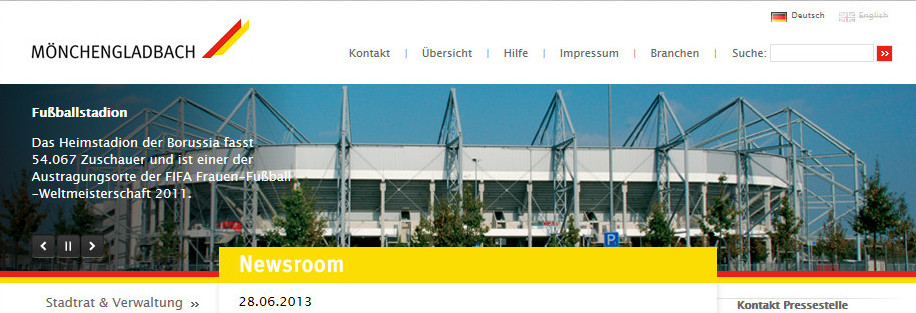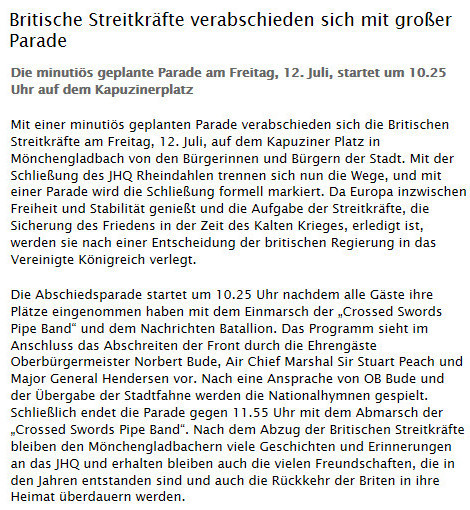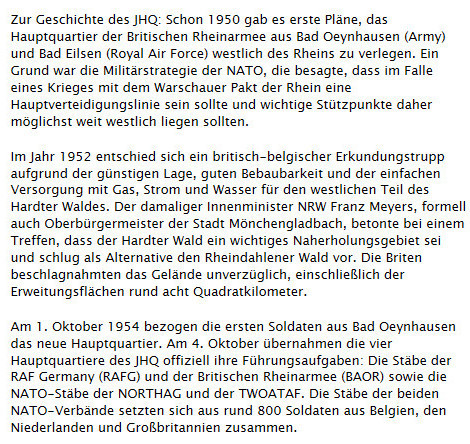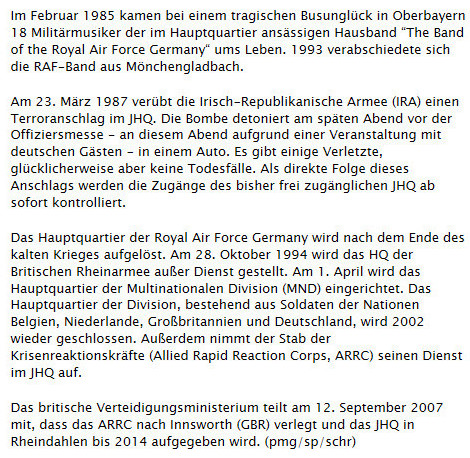| An article from the website of Moenchengladbach describing the events that took place at JHQ in July 2013 to celebrate the closure of the Garrison. See below for English translation of the article!
|
   
|
| British Forces say goodbye with a big parade
The meticulously planned Parade will take place on Friday, 12th July 2013, starting at 10:25 on the Kapuzinerplatz The British will be bidding farewell to the citizens of Moenchengladbach on Friday, 12th July 2013, with a meticulously planned parade on the Kapuzinerplatz. The closing of JHQ Rheindahlen marks the separation of ways and will be formally acknowledged by this parade. As Europe now enjoys peace and stability, and the role of the British Forces, the keeping of the peace during the Cold War is finished they are being returned to the United Kingdom. The farewell parade begins at 10:25, after all of the guests have taken their seats, with the marching in of the Crossed Swords Band and the Communications Battalion (Royal Signals?). The program will continue with the inspection of the guard by the Mayor, Norbert Bude, Air Chief Marshall Sir Stuart Peach and Major General Henderson. After a speech by Mayor Norbert Bude and the exchange of flags the national anthems will be played. The parade will conclude at 11:55 with the marching-out of Crossed Swords Band. After the departure of the British Forces many Gladbacher will retain the many stories and memories of JHQ and the many friendships that have developed over the years and they will last beyond the return of the British to their homeland. Concerning the history of JHQ: In 1950 the first plans were made to transfer the Headquarters of the British Army of the Rhine from Bad Oeynhausen (Army) and Bad Eilsen (Royal Air Force) to the west bank of the Rhine. One reason for this decision being the military strategy of NATO, which stated that, in the case of a war with the Warsaw Pact, the Rhine would be the main line of defence and that important garrisons should be placed to the west of the Rhine. In 1952 a British-Belgian Investigation team decided, based on the good location, suitability for building on, a easy provision of gas, electricity and water, to use the western part of the Hardter Wald. The then Interior Minister of North Rhine Westfalia, Franz Meyers, also formally the Mayor of Moenchengladbach, insisted at a meeting, that the Hardter Wald was an important recreational area and put forward the suggestion that the Rheindahlener Wald would be a better location. The British immediately requisitioned the land, included adjoining areas amounting to almost 8 square kilometres. On the 1st October 1954 the first soldiers from Bad Oeynhausen transferred to the new headquarters. On the 4th October 1954 the four group headquarters in JHQ officially took over their control responsibilities: the groups of the Royal Air Force Germany (RAFG) and the British Army of the Rhine (BAOR) as well as the NATO groups NORTHAG and TWOATAF. The two NATO groups comprised around 800 soldiers from Belgium, the Netherlands and Great Britain. In February 1985 18 Military musicians who played in the JHQ-based Military Band, “The Band of the Royal Air Force”, died in a tragic bus accident in Oberbayern. The Band left Moenchengladbach in 1993. On the 23rd March 1987 the Irish Republican Army (IRA) carried out a terrorist attack on JHQ. The car bomb detonated late evening in front of the Officers Mess which was hosting a reception that included German guests. Some people were injured but luckily there were no fatalities. As a direct result of this attack the entrances to the previously “open” JHQ were strictly controlled. The British Ministry of Defence announced on the 12th September 2007 that the ARRC (Allied Rapid Reaction Force) which was based in JHQ would be transferred to Innsworth in Great Britain and that the JHQ in Rheindahlen would be closed by 2014. (pmg/sp/schr) Translation by Fred Williams |
